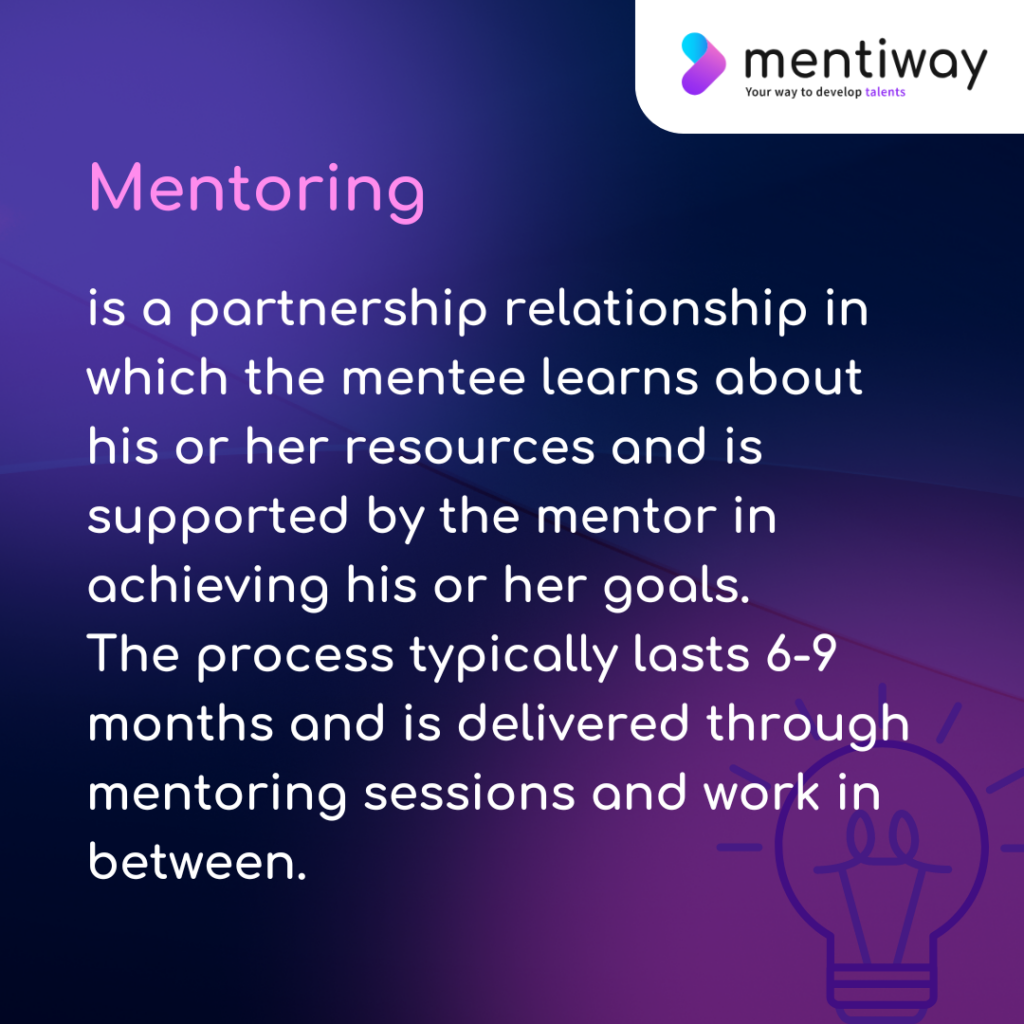How and what to discuss with the Mentor?
How to talk to a Mentor? What to talk about with the Mentor? These are questions that often arise for Mentee before starting the mentoring process. We’ve already alluded to this topic in several previous articles, but now I’ve decided to put it all together in the form of a single resource – a guide for beginning Mentees who are starting their first mentoring process.
What mentoring is all about

Before we get into specific answers to these questions, it is helpful to make sure that you as a Mentee adequately understand what mentoring is, what the Mentor’s role is, and what the purpose of the process and each meeting is.
Let’s start with a reminder of what mentoring is all about. I described this topic in a previous article: what mentoring is. In simple terms, mentoring is a relationship-based process in which the Mentee recognizes himself, sets his goals and pursues them with the help of a companion – the Mentor. As a result, he develops, gains new knowledge and new experience drawing on the support of the Mentor.
Mentoring usually takes the form of a closed process, that its beginning and end, and with a specific structure described in the aforementioned article. Very often, mentoring processes are implemented as part of a larger mentoring program that has a clearly defined goal.
What is the role of the Mentor
You already know what mentoring is, now it’s time to define the role of the Mentor. Here, too, we have available a more comprehensive article on the subject: Mentor – competencies, role and responsibilities.
In the short version: the Mentor’s role is defined in several areas:
- Companionship – that is, being a partner for Mentee on their development path. Building a sense of security, trust, motivating them to find different paths.
- Supporting – showing interest, giving courage, boosting confidence.
- Active listening and asking questions – attentiveness to what the Mentee is saying, but also deepening, asking questions, paraphrasing, encouraging self-reflection through threading. See more about questions in a mentoring process.
- Analyzing, drawing conclusions, and giving feedback – the ability to connect multiple dots, analyze what the Mentee is communicating, and give honest constructive feedback.
- Sharing his/her knowledge and experience – but only after the Mentee has exhausted his/her abilities. The Mentor should first and foremost encourage the Mentee to work independently, and only at the end, at the Mentee’s express request, can he share his own knowledge.
One very important fact about mentoring also emerges from these areas. Mentoring is not counseling / consulting. The Mentor’s role is not to advise how to solve a particular problem. The role is also not to teach the Mentee, it is not training. The Mentor’s behavior should be more in the nature of coaching and accompanying in development.
Any mentoring process should have goals
We are already slowly approaching the conversation itself, but before we move on to the mentoring sessions one more very important element – that is, the goals of the mentoring process.
And again, we have a more elaborate article on this: goals in mentoring. Here, only briefly, any mentoring process must have clearly defined goals. A Mentee joining a mentoring program usually already has some of his or her own motivations and an outline of goals. Later, during the first sessions, the Mentee together with the Mentor discuss these goals, getting to the bottom of them and clarifying them in terms of measurable outcomes.
These goals accompany the mentoring couple for the rest of the process. They should be kept in mind for each mentoring session, and their level of achievement should be assessed by the couple at the end of the process.
What a mentoring session looks like
Finally we come to the mentoring session – that is, simply meetings between Mentor and Mentee.
Each mentoring session should have a goal– determined by the Mentee before the meeting begins. This topic should coincide with the goals of the entire mentoring process and will depend on the Mentee’s current progress toward those goals.
Most often, the first session is exploratory and organizational. Its purpose is to build a relationship and establish rules for further cooperation (mentoring contract). During the second session, the couple works on goals – deepening them, clarifying them. Each subsequent session already has a very individual goal and course, which depends on what the Mentee wants to achieve, by what route and what rules of cooperation will be agreed with the Mentor.
What to talk about with your Mentor
So what to talk about with the Mentor? Well, that’s it – it all depends on the goals of the whole process, the planned topic of the mentoring session, what stage of the process you are at, what ideas and arrangements you have for the whole process.
If you are asking yourself such a question, you probably haven’t started the process yet. In this case, first of all, get to know each other better during the first meeting. Ask about hobbies, work experience. Find topics that will connect you, where you will find a common language. Let everyone talk about how they envision the mentoring process. The mentee can also present his/her own preferences for the ways of learning and acquiring knowledge that are most effective for him/her. Later, confirm the various elements of the contract. Agree on how often you want to meet, how long the meetings should last. Both of you should also agree on privacy arrangements and full honesty during meetings.
Later or as early as the second meeting talk about the Mentee’s goals for the process. Have the Mentee outline these goals, and have the Mentor use techniques to deepen them.
The work on the goals should, in addition to clarifying them and defining measurable results, also show the path to achieving these goals – including specific milestones and perhaps specific tasks to be completed. As a result, you may already have specific topics and issues to address at future meetings.
An example scheme for the beginning of each successive session might be:
- Discuss what happened between sessions, which may be relevant to the session or to achieving the goals of the process.
- Discussion of the results of the “homework” – the task set as to be completed between sessions.
- Agreeing on the goal / theme for the session. It is good if the Mentee establishes and shares this topic with the Mentor before the meeting starts.
- An experienced Mentor will guide the conversation by asking relevant questions. Alternatively, he or she may suggest performing some exercise / technique together.
It is worth mentioning here that in the Mentiway platform, we have included a dedicated module for suggesting schemes and session agendas depending on the stage of the process. This greatly facilitates the preparation for and execution of meetings for novice Mentors, Mentees and Mentees.
How to talk to a Mentor
The second common question is how to talk to a Mentor. Here, in response, I have prepared a few issues to pay attention to:
- Maintain attention -be here and now with your Mentor, listen carefully, try to understand what the other person is saying.
- Be open and honest – only a frank conversation guarantees that together you will get to the bottom of the issues, that the Mentor will know the full picture. Here it is worth mentioning that mentoring pairs should not include people with project or personnel dependencies. Maintaining full honesty in front of a supervisor, for example, is virtually impossible.
- Be open to feedback and paradigm shift – the mentoring process is largely based on honest self-knowledge, without biases and limitations. Openness to change is key to accepting a different point of view about yourself and the topics around you.
- Don’t be afraid to challenge, experiment – during the mentoring process, ideas may arise to try different methods to solve a given challenge. It’s worth using them, testing and learning from them.
- Communicate non-violently – talk about what YOU feel, what YOU have thoughts and needs. Avoid communication based on what someone else did, why they might have done it, what they might have thought.
Discuss facts, express your needs and your expectations. If you expect a change, talk about how YOU would feel if something happened, not that this is how something should happen, that this is how things should be done.
Hi, my name is Thomas. I am the Co-Founder of Mentiway. We are happy to share our knowledge and support organisations on their way to success! 💪 If you are interested in how to efficiently and effectively implement a mentoring programme in your organisation using technology:








